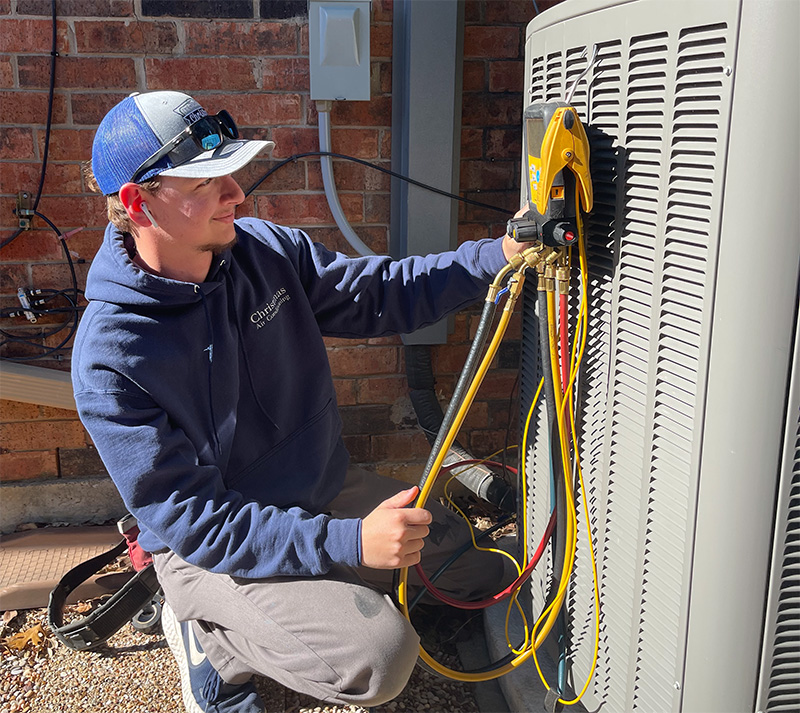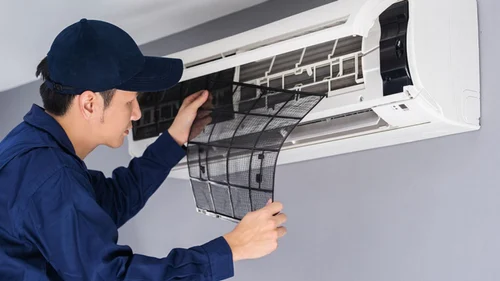Fascination About Ac Fixing
Fix Air Conditioner: Specialist Cooling System Remediation Guarantees Your Home Remains Comfy Throughout The Year
Types of Air Conditioner Systems
When tackling a/c repair work, understanding the kind of cooling system you're dealing with can save time, cash, and irritation. Ever wondered why some systems cool a room much faster than others? Or why specific systems seem to break down more frequently? Let's peel back the layers.
Central Air
The smart Trick of Air Conditioner Repair Near Me That Nobody is Discussing
Envision a get more info cool breeze streaming through an entire home, whispering comfort into every corner. Central air systems do exactly that. They use a network of ducts to disperse cooled air, counting on a compressor and condenser outside, coupled with an evaporator coil inside. But when this complex beast fails, determining the problem can be like discovering a needle in a haystack.
Split Systems

Split systems are a popular option for lots of homes-- part indoor unit, part outdoor compressor. They use versatility and efficiency, but their dual nature suggests repair work can involve either component. Have you ever heard a strange noise outside your home just to find the indoor unit isn't cooling? That's a traditional sign of a split system glitch.
10 Easy Facts About Fix Air Conditioner Explained
Window Units
These compact warriors fight summer heat by fitting comfortably into a window frame. They integrate all components into a single box. Their simpleness typically suggests fewer repair work headaches, but overlooking filters or permitting debris accumulation can cause decreased performance or breakdowns.
Ductless Mini-Splits
Some Known Questions About Ac Air Conditioner Repair.
Ductless systems bypass ductwork totally, making them ideal for homes without existing ventilation. They're peaceful, effective, and surprisingly resilient. Yet, when repair work are required, technicians need to be adept at dealing with refrigerant lines and electrical connections-- no small accomplishment.
Quick Referral Table
| Type | Secret Includes | Common Repair Issues |
|---|---|---|
| Central Air | Ductwork, whole-house cooling | Duct leaks, compressor failure |
| Split System | Indoor & & outside units | Refrigerant leaks, fan motor problems |
| Window System | All-in-one, simple setup | Unclean filters, electrical faults |
| Ductless Mini-Split | No ducts, zoned cooling | Line leaks, sensor breakdowns |
The 2-Minute Rule for Repair Air Conditioner Near Me
Unwinding the A Lot Of Regular A/c Issues
Have you ever wondered why your air conditioning system suddenly stops cooling during a sweltering afternoon? One common culprit is a dirty or clogged air filter. This tricky bad guy limits airflow, requiring your system to work overtime, which not only reduces effectiveness however can also result in early breakdowns. Think of attempting to breathe through a scarf taken in dust-- it's tiring!
Another regular hiccup is refrigerant leakages. These invisible leakages don't just decrease cooling power but can also harm the compressor, the heart of your air conditioner unit. How frequently do you look for uncommon hissing noises or ice development on the coils? Capturing these signs early can conserve you from costly repair work down the line.
Beyond the Basics: Lesser-Known Issues
Examine This Report about Air Conditioning Repair
Often, the thermostat itself is the mischief-maker. Miscalibrated or malfunctioning thermostats send out blended signals, causing the AC to cycle unpredictably. Ever experienced your AC turning on and off in fast succession? That's called brief cycling, a sneaky efficiency drainer that can break parts faster than you 'd expect.
Electrical problems, such as worn circuitry or a malfunctioning capacitor, may prowl below the surface. AC Air Conditioner Repair. These often manifest as a/c units stopping working to begin or all of a sudden closing down. An expert eye understands to evaluate these components with precision tools, something a casual glimpse won't reveal
Professional Tips for Diagnosing Common Air Conditioning Problems
Getting The Ac Air Conditioner Repair To Work
- Inspect and replace air filters routinely-- every 1 to 3 months depending upon usage and environment.
- Listen for unusual noises like rattling or buzzing that might signal loose parts or electrical faults.
- Inspect the outdoor unit for particles or blockages that impede air flow and trigger getting too hot.
- Try to find frost accumulation on evaporator coils, a hint towards refrigerant problems or air flow limitations.
- Evaluate the thermostat settings and recalibrate if the temperature level readings feel off.
Quick Referral Table: Manifestation & & Probable Triggers

| Symptom | Probable Cause | Expert Tip |
|---|---|---|
| Warm air blowing | Low refrigerant or filthy coils | Tidy coils and examine for leakages instantly |
| Short biking | Thermostat issues or large unit | Adjust thermostat settings and consult sizing standards |
| System won't start | Electrical faults or capacitor failure | Test electrical wiring and change capacitors as needed |
| Water leak | Obstructed drain line or frozen evaporator | Clear drain lines and examine for coil icing |
DIY AC Maintenance Tips
Air Conditioner Repair Near Me Can Be Fun For Anyone
Ever discovered your air conditioning system sputtering like an old engine on a hot summer season day? Ignoring subtle indications frequently implies more than simply a sweaty afternoon-- it's a prelude to unforeseen a/c repair work expenses. However what if you could catch those whispers before they become wails? Routine DIY maintenance can be your first line of defense.
Simple Actions to Keep Your AC Running Efficiently
The 20-Second Trick For Ac Repair
- Tidy or Replace Filters: A stopped up filter is like trying to breathe through a scarf. Every 1-3 months, examine and swap out your filters. It enhances airflow and performance, avoiding compressor stress.
- Check the Condenser Coils: Dust and particles act as undetectable blankets smothering your system's cooling power. Carefully brush or vacuum the coils, but avoid harsh chemicals that might deteriorate the metal.
- Check the Drain Line: When was the last time you glanced at your drain pan? A clogged drain can trigger water leakages and foster mold development. Flushing it with a vinegar solution month-to-month keeps the circulation clear.
- Seal and Insulate: Are your ductworks whispering leakages? Sealing spaces with mastic or foil tape improves efficiency and minimize irregular cooling.
Pro Tips Beyond the Basics
- Step your unit's voltage to catch subtle electrical wear before it triggers big issues.
- Listen for uncommon hums or rattles-- these acoustic breadcrumbs frequently signal loose parts or failing motors.
- Keep outdoor units shaded but guarantee at least 2 feet of clearance around them for optimal air flow.
Ask yourself: Are you hearing your air conditioning's quiet SOS or just awaiting it to scream? Taking some time for DO IT YOURSELF a/c upkeep changes reactive repair work into proactive care, saving sweat, stress, and yes, cash.
What Does Ac Repair Mean?
Why Proficiency in Air Conditioner Repair Matters
Picture this: your air conditioner system sputters and groans throughout a scorching afternoon, leaving you sweltering inside. Would you trust a novice fumbling with delicate components, or would you look for the reassurance of a professional a/c specialist!.?.!? The intricacies of modern-day cooling systems require precision and experience. A small mistake can intensify a small malfunction into a costly disaster.
The Facts About Air Conditioning Repair Near Me Revealed
Unseen Complexities Behind the Cool Breeze
Lots of undervalue the layers hidden below the sleek outside of an a/c system - AC Fixing. From refrigerant leakages that silently drain pipes performance to faulty thermostats that misread temperature levels, these concerns require more than a standard toolkit. Professionals have a keen eye for diagnosing issues that balance homeowners neglect
Essential Tips for Selecting the Right Technician
The Ac Repair Near Me Statements
- Certification and Training: Confirm credentials; a technician trained in the most recent HVAC technologies is indispensable.
- Experience with Specific Systems: Not all a/c systems are created equal; discover somebody acquainted with your design's quirks.
- Diagnostic Technique: Knowledgeable specialists use advanced tools-- like electronic leak detectors and thermal imaging-- to pinpoint concealed faults.
What to Anticipate from a Pro's Diagnostic Process
| Step | Purpose | Specialist Insight |
|---|---|---|
| Visual Inspection | Determine apparent wear or damage | Search for corrosion or uncommon sounds-- an indicator often ignored |
| Pressure Checking | Find refrigerant leakages | Subtle pressure drops can mean micro leaks invisible to the naked eye |
| Electrical Checking | Guarantee circuit stability | Loose connections can simulate serious mechanical failures |
Air Conditioner Repair Near Me Fundamentals Explained
Why Do It Yourself Frequently Falls Short
Tempting as it is to play with your air conditioning unit, do it yourself repairs frequently miss out on the root cause. For example, completing refrigerant may momentarily cool your space however neglects leakages that intensify with time. Professional professionals don't simply patch signs; they hound the underlying mechanical and electrical faults that sap performance.
10 Easy Facts About Ac Repair Near Me Shown
Concerns to Ask Before Hiring
- What diagnostic tools do you use to determine problems?
- Can you discuss the repair process and anticipated results?
- Are you familiar with the refrigerants suitable with my unit?
- Do you follow safety protocols for managing electrical elements?